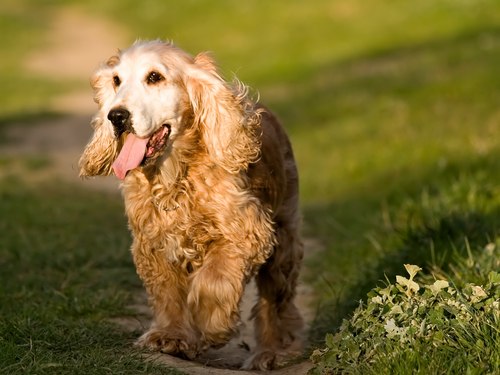As our dogs get older, they sleep more, move more delicately, and require more effort to do the things they love. The physical changes are clear to see, but what about their aging minds?
If you notice your senior dog pacing, having accidents in the home, or even “forgetting” their favorite people, places, and things, it could be Canine Cognitive Dysfunction (CCD).

Sadly, Canine Cognitive Dysfunction or Doggy Dementia is quite common, with more than 50% of dogs over the age of 10 experiencing symptoms.
Below we’ll discuss what causes the disease, how to recognize the signs, and how to help your senior dog live their best life despite dementia.
What is Canine Cognitive Dysfunction?
Dementia in dogs and humans is a degenerative condition of the mind that progressively gets worse over time. Currently, scientists and medical professionals believe it is caused by plaque that grows on the brain. These plaque deposits result in cell death and decreased oxygen levels in the brain.
If you suspect your dog is suffering from senility, discuss the issue with a trusted veterinarian. They can offer advice on treatments, medications, and herbal supplements to help ease the symptoms.
What are the common signs of CCD?
There are several signs that a dog may be suffering from dementia, but unless an owner is looking for more than one or two, they could be passed off as random or silly things a dog does. Some of the more common indicators are when a dog gets “lost” in a corner, behind furniture or doors. The dog may want a drink of water and finds himself in, what he believes, to be unfamiliar territory. A dog may also forget the housetraining that never had been an issue before. Human companionship may be shunned, or the dog may shy away from being petted. Since every dog is unique, not all dogs will present with the same symptoms. If a dog begins to act odd or doesn’t quite seem like himself, it’s best to get him to the vet. Some dog parents report that the symptoms worsen at night.
Treatment
Once it has been determined that the senior dog does indeed have dementia, the veterinarian may suggest the use of SAMe (S-adenosylmethionine) or some other brain support supplement, with appropriate dosages. They may also recommend maintaining a regular exercise routine. Physical exercise is important for every dog at any age.
Prevention There is no cure for old age. Humans have been hunting for the proverbial fountain of youth for centuries. What may help slow down the aging process and cognitive dysfunction is a healthy, canine appropriate diet full of omega-3 fatty acids. Omega-3’s continue to keep brain synapses firing on all cylinders. Maintaining a regular exercise schedule, with both physical and mental stimulation, will help the dog remain alert and healthy. Cherish the moments he’s healthy and if his memory fails, remind him he’s loved.
